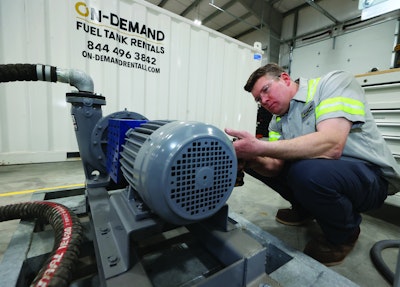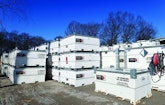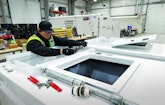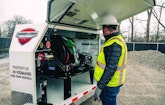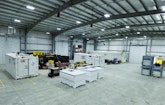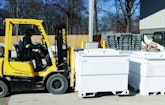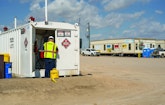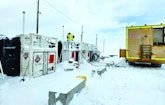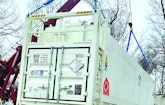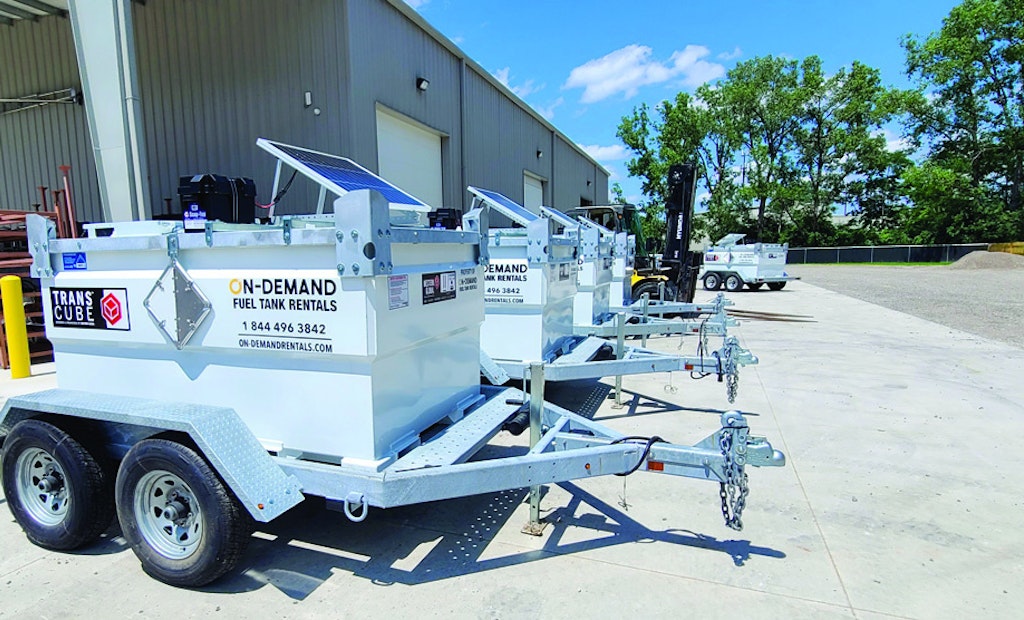Interested in Portable Sanitation?
Get Portable Sanitation articles, news and videos right in your inbox! Sign up now.
Portable Sanitation + Get AlertsNot every young, small company has a coast-to-coast footprint. But On-Demand Rentals does, though it was founded a mere seven years ago. In fact, company management sees more expansion in the near future.
“As things continue, if we keep our growth trajectory, we will be opening more facilities across North America as customer demand develops,” says Michael Truan, general manager of the Waterford, Michigan-based and family-owned company.
On-Demand is a niche rental agency in the forefront of changing how heavy equipment operators do business. Specifically, more and more operators of such equipment are opting for bulk deliveries of fuel
to temporary storage tanks situated onsite. On-Demand Rentals provides the tanks.
The more traditional fueling scheme is called wet-hosing, meaning that at the end of a workday, fuel distributors visit construction sites or other places where heavy equipment is in operation and replenish the tanks of each piece of equipment directly from a fuel truck. That approach has fallen victim to the same labor shortage the rest of heavy industry is experiencing.
“The driver shortages and an aging driver trend have put a pinch on companies and hindered their services,” Truan says. “For greater reliability and more sustainable operations, it makes more sense to drop more fuel at one time rather than put 10 gallons of fuel in one excavator and 40 gallons in another and so on. It is a lot more efficient for fuel suppliers to drop off a thousand gallons or 5,000 gallons, filling temporary fuel storage tanks at the site.”
This is where On-Demand Rentals comes in. They have tanks of various sizes and configurations for use by contractors, trucking operators and government agencies working on temporary job sites — or in natural disaster situations.
WHERE IT BEGAN
On-Demand Rentals dates from 2016, when the Truan family went into business offering new and used generators and power generation equipment — including fuel storage tanks. The demand and request for fuel solutions helped them sense a growing need for the containers. They quickly transitioned the company into a specialty rental outlet for fuel tanks.
“As we got into it, we realized it was more than a local business need,” the general manager says.
The variety of clients needing temporary fuel storage is broad ranging from companies with equipment working in the aftermath of natural disasters to construction contractors, logistics companies, mining firms, fuel distributors and petroleum equipment installers, municipalities and property management companies. Not to mention On-Demand offers such customers the option of short- or long-term rental of the tanks. “We started by offering 500-gallon or 1,000-gallon tanks and then moved to other sizes,” Truan says. “We now specialize in 2,300-gallon to 18,000-gallon models.”
These are not traditional cylinder-shaped units. They are large metal boxes, either square or rectangular. Each tank has an integrated compartment at one end housing its pump and connectors. This is partly an environmental feature because it captures any dripping fuel at connecting points.
The sizes of the tanks are keyed to shipping container sizing rather than gallonage. A 10-foot tank holds 2,300 gallons, a 20-footer 8,000 gallons and a 40-foot container, 17,500 gallons. Each tank is certified to handle diesel, gasoline, Jet-A, JP8 and other fuels. In most cases, the fuel is diesel, with only a small percentage of On-Demand rental tanks used for gasoline or aviation fuel.
EQUIPMENT TO SUCCEED
On-Demand Rentals partners with various manufacturers for its inventory of certified, high-quality equipment. They include Western Global containerized tanks, Thunder Creek mobile fuel trailers, Bennett fuel dispensers and FMT fuel management systems.
The box-like configuration of the tanks helps On-Demand with the logistics of moving the fuel containers. First, the squared-off tanks are not oversized as rounded and cylindrical tanks sometimes are, so transporting them on public highways is easier. On-Demand partners with specialty transport contractors to deliver tanks to customers, and the design of the tanks gets a thumbs-up from the trucking firms.
Most of the rental tanks leave the equipment yard with the optional pump setup installed. The pumps can be custom-configured to deliver fuel to a single piece of equipment or to several machines simultaneously and to feed the fuel at a rate ranging from 20 gallons a minute to 300 gpm.
The units are double-walled, UL-listed structures acceptable to fire marshals in most jurisdictions and states. They are fabricated of heavy-gauge steel, and some are lined to better accommodate the needs of aviation fuel customers or distributors of specialty liquid products.
HAVE A PLAN
Natural disasters are not a godsend to any company — no one wishes a hurricane, tornado, fire or flood on anyone — but the company nonetheless is prepared for “whatever Mother Nature throws at us.” More to the point, it counsels companies, government agencies and fuel distributors to prepare for such weather events.
“For some reason, people always forget about how they are going to get fuel during disasters,” says Truan. “All of the equipment they have, yet without fuel they can’t do anything. We try to put our customers in the mindset of preparing for emergencies by having onsite fuel storage.”
He cites a national report that gasoline stations in an area typically have enough fuel on hand at any given hour to fill up about half of the vehicles in the area. Consequently, when a storm approaches and people are asked to evacuate, the run on the stations quickly depletes underground storage.
“This is before the storm or wildfire even hits the area, yet the fuel already is gone. Then the disaster strikes and you’re already in a negative fuel supply situation with emergency equipment on its way to clean up the area, which means more demand for fuel.”
On-Demand’s response to that scenario is what it calls its “contingency program” for customers. Basically, a customer is assured that tanks will be held in reserve for him. An On-Demand contract stipulates that needed tanks will be en route to a location within 24 hours of a customer calling and declaring an emergency.
What this means for On-Demand Rentals is that, on top of meeting the needs of business-as-usual customers, it always must have on hand additional tanks for immediate transport to companies or localities experiencing a crisis. The logistics behind such a contract seem fairly daunting.
“We pretty much make what needs to happen, happen,” the general manager says of crunch-time responses to customer emergencies. It helps that the company has a vast commitment with an extensive inventory of tanks in multiple locations. That is, not all the company assets are in Michigan. Instead, tanks are staged in various rental locations in population centers across the country for faster local delivery.
TIP-TOP SHAPE
It is extremely important that fuel tanks and equipment remain in top serviceability. Because fuel is hazardous, hoses, filters, emergency venting and other items are regularly checked and replaced as needed. “Our top priority is to keep users safe and the environment protected,” says Truan.
And then there is the cleaning of tanks. A clean tank is a core value for the team at On-Demand.
“It’s a little bit crazy what many fuel distributors do. Their tanks can be in the fleet for 20-30 years without ever being cleaned,” he says. “When I talk to clients, I ask them, ‘Is it a problem for you if your trucks don’t have the oil changed or otherwise aren’t serviced?’ Of course, it’s a problem. The same goes with a fuel tank.”
Truan goes on to say that a tank is a piece of equipment that affects every other piece of equipment in the yard. He tells the story of a contractor he knew who had 300 hydraulic excavators working on a large pipeline project. When a bad load of fuel was delivered to the job site, half of the excavators were idled. The fuel distributor declined to accept any responsibility for the contaminated fuel and the contractor lost a huge amount of productive hours and who knows how much money.
“That is why I am passionate about clean tanks. The usual standard is to maintain all the other pieces of equipment on a project. Why not the fuel tanks?”
On-Demand Rentals’ tank-cleaning regimen is impressive. Each tank has a “manway” built into it — an opening through which a cleaning person can enter the tank. After every customer use, a cleaner runs a pneumatic vacuum over every inch of the interior to remove any residue from the previous load. Then, if a tank is used to hold diesel fuel, the tank is rinsed out using verifiably clean diesel. Each tank also is treated for bacteria contamination.
“Treating fuel storage vessels with extra care can enable a project to move forward without a hitch,” says Truan.
FUEL AND CUSTOMER SERVICE
On-Demand Rentals seems to be delivering what customers need, both for everyday operation and in emergency situations. This responsiveness was cited by a customer recently, according to Truan. “He told me, ‘You just take care of things. Whatever it is. We don’t even have to think about it.’”
Another On-Demand customer previously had a tank from another company and experienced problems with its pump not recording properly. “She said, ‘You gave us a proper system, a superior piece of equipment that works and we don’t even have to worry about it.’ That’s our goal. We are a solutions company, providing equipment that satisfies each customer’s need.”
And what’s the next solution the company will offer? Turns out, the next solution is on wheels: trailered tanks. The company has begun offering small fuel containers — with a capacity of 500-900 gallons — that are fitted to running gear so they can be towed to individual idled pieces of equipment on a site. Besides offering mobility, the multicompartmented tanks can be moved around a job site or a natural disaster scene by any employee. No CDL or a hazmat rating is required to move them.
More cost-efficient convenience, courtesy of On-Demand Rentals.
